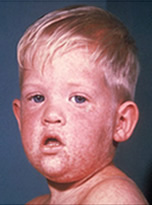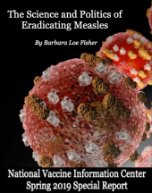Measles Disease & Vaccine Information - National Vaccine Information Center

Measles: The Disease
Measles (rubeola) is a highly contagious respiratory disease spread by coughing, sneezing, or simply being in close contact with an infected individual. The disease can be spread even when the rash is not visible. Measles tends to be more severe in children under 5 and adults over 20. Initial measles symptoms include fever, cough, runny nose, red irritated eyes, and sore throat with tiny white spots on the cheeks inside the mouth (Koplik spots). These symptoms generally last 2-4 days and are followed by the signature itchy red rash which appears on the body around the fourth or fifth day.
The majority of measles cases in the U.S. resolve without complication, though serious complications can occur. According to the Centers for Disease Control (CDC), Americans born before 1957 have naturally-acquired immunity to measles through past exposure to the illness. Infants born to mothers with naturally-acquired antibodies to measles benefit from passive maternal immunity. There is also evidence that mothers who have recovered from measles pass short-term measles immunity to their infants by breastfeeding. Learn more about Measles…

Measles Vaccine
Measles vaccine is a weakened (attenuated) form of the live measles virus. There are 2 vaccines currently available for use in the U.S.: Merck's MMRII, which contains Measles, Mumps and Rubella Vaccine, Live; and Merck's Proquad (MMRV), which contains Measles, Mumps, Rubella and Varicella, Live. The CDC currently recommends that children receive two doses of a measles containing vaccine, with the first dose administered between 12-15 months, and the second dose between 4-6 years. The CDC also recommends that individuals born after 1957 and have no laboratory evidence of immunity or documentation of vaccination should receive at least one dose of MMR vaccine. Learn more about Measles vaccine…
Measles Quick Facts
Measles
- After coming in contact with someone infected with measles, the incubation period to onset of the rash is between 7 and 21 days, with an average of 14 days. The period leading up to the appearance of the rash is characterized by a rising fever that peaks at 103-105 degrees F.
- In 1960, three years beforethe first measles vaccine became available in the U.S., there were approximately 442,000 reported measles cases and 380 related deaths, among the 3.5 to 5 million Americans who were likely infected with measles. Measles-associated deaths are rare in the U.S. and the last reported death occurred in 2015. Continue reading quick facts…
Measles Vaccine
- There are two measles vaccines currently in use in the United States - MMRII - a combination measles-mumps-rubella (MMR) live virus vaccine and ProQuad- a combination measles-mumps-rubella-varicella (MMR-V) live virus vaccine. Both MMRII and ProQuad are manufactured and distributed by Merck. The CDC recommends children receive the first dose of MMR vaccine between 12 and 15 months, and the second dose between 4 and 6 years.
- As of May 31, 2019, there have been more than 94,972 reports of measles-vaccine reactions, hospitalizations, injuries, and deaths following measles vaccinations made to the federal Vaccine Adverse Events Reporting System (VAERS), including 468 related deaths, 7,127 hospitalizations, and 1,820 related disabilities. Over 50% of those adverse events occurred in children three years old and under. Continue reading quick facts...
Learn More About Measles and Measles Vaccine
Click here to view, download, or print all sections below as one document or webpage.
NVIC encourages you to become fully informed about Measles and the Measles vaccine by reading all sections in the Table of Contents below, which contain many links and resources such as the manufacturer product information inserts, and to speak with one or more trusted health care professionals before making a vaccination decision for yourself or your child. This information is for educational purposes only and is not intended as medical advice.
References:
1 CDC Measles (Rubeola) – Transmission of Measles. Feb. 5, 2018
2 CDC Measles (Rubeola) - Complications of Measles. Jun. 13, 2019
3 CDC. Measles – Severe Complications. Epidemiology and Prevention of Vaccine-Preventable Diseases. 13th Edition. Pg 210. April 2015.
4 CDC Measles (Rubeola) For Healthcare Professionals – Evidence of Immunity. Feb. 5, 2018
5 Adu FD, Adeniji JA. Measles Antibodies in the Breast Milk of Nursing Mothers. Afr J Med Med Sci. 1995 Dec; 24(4):385-8.
6 FDA Measles, Mumps and Rubella Virus Vaccine, Live May 16, 2017
7 FDA ProQuad Product Insert Jan. 22, 2019
8 CDC Prevention of Measles, Rubella, Congenital Rubella Syndrome, and Mumps, 2013: Summary Recommendations of the Advisory Committee on Immunization Practices (ACIP) MMWR Jun. 14, 2013; 62(RR04);1-34
9 Ibid
10 CDC Measles – Clinical Features. Epidemiology and Prevention of Vaccine-Preventable Diseases (The Pink Book). 13th ed. 2015.
11 CDC Reported incidence of notifiable diseases in the United States 1962. MMWR Sep. 16, 1963; 11(53): 1-29
12 National Center for Health Statistics. U.S. Vital Statistics Mortality Data. National Vital Statistics System.
13 CDC. Measles, Mumps and Rubella – Vaccine Use and Strategies for Elimination of Measles, Rubella and Congenital Rubella Syndrome and Control of Mumps: Recommendations of the Advisory Committee on Immunization Practices (ACIP). MMWR May 22, 1998; 47(RR-8): 1-57.
14 Wood DJ, Brunell PA. Measles Control in the United States: Problems of the Past and Challenges for the Future. Clin Microbiol Rev 1995; 8(2): 260-267.
15 CDC Summary of Notifiable Infectious Diseases and Conditions — United States, 2015 MMWR Aug. 11, 2017; 64(53);1–143
16 FDA Measles, Mumps and Rubella Virus Vaccine, Live. May 16, 2017
17 FDA ProQuad Product Insert Jan. 22, 2019
18 CDC Prevention of Measles, Rubella, Congenital Rubella Syndrome, and Mumps, 2013: Summary Recommendations of the Advisory Committee on Immunization Practices (ACIP) MMWR Jun. 14, 2013; 62(RR04); 1-34

Comments
Post a Comment